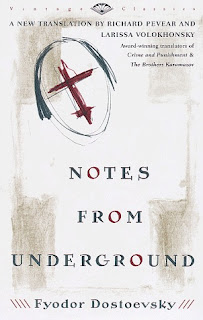It’s About THAT Guy
By Fyodor Dostoevsky
Translated by Pevear & Volkhonsky
Russian, 1864
Existentialist Philosophy, Novella
Main Attractions
1. The Most Comedic, Painful Narrator
2. Great Insights into the Dark Side
3. Highly Quotable Lines of Greatness
4. Philosophy of the Human Condition
5. Great Intro to Existential Novels
6. Easy to Read, Yet Astounding Depth
7. A Snippet of Life Underground
8. More Enjoyable After Re-Reading it
9. A 40 Year Old Reflects on Being 24
10. Asks the Ignored Bigger Questions
Cuisine & Delicacies
Ranked as: Decadent Chocolate Cheese ’N Cake
The first part is a lively philosophical social commentary but the 2nd part takes a radical turn! It’s told as a flashback and becomes more and more embarrassing for the narrator. Understanding a lot of this book depends on the social context of the time which can make it confusing for the reader and possibly difficult to finish.
Why Visit Here
Everyone has faced the darker aspects of the self, this novel showcases it with such psychological depth. At times, it’s over the top and goes to great length to show just how far a character will go to sustain their position while suffering. It’s a great journey into the mind of a suffering protagonist.
The Literary Conversation:
These 3 books were written in reply to each other:
✓ Fathers and Sons By Ivan Turgenev (1862) - It started it all with a powerful story about tensions between generations & social change, introducing Nihilism.
✓ What is to Be Done By Nikolai Chernyshevsky (1863) — He added a Feminist spin and political/economic themes to the dialogue, introducing some idealist solutions.
✓ Notes from the Underground By Fyodor Dostoevsky (1864) - He took the idea of Nihilism and ran with it, crushing any idealist notions with practicalities of social conventions or poverty.
Destination Summary
The unreliable, unnamed narrator gripes and complains about everything. His ideas are presented in a very personal way and the reader can’t help but react to his actions & dialogue. At times, he is comical in his extremely melodramatic suffering. Other times, it’s painful to read what he says, thinks or does. The reader is left with a clear glimpse into the shadow of the soul.
Fabulous Summary by Thug Notes in 4:29 min.
Packing List
✓ Wet Blanket
✓ An Ant Farm to Shake
✓ Reading Chair Under a Bridge
Recommended Resources
Alternate Books
✓ Nausea By Jean-Paul Sartre (1938) - His break with reality maybe self imposed, is told with a different writing style and has deep insights.
✓ A Hero of Our Time By Mikhail Lermontov (1840) - The main character is satirical hero who is comically bitter and even teeters on cruel.
✓ Demons (also called Devils/The Possessed) By Fyodor Dostoevsky (1872) - He goes much deeper into ideas that he started in Notes from the Underground.
✓ The Will to Power By Friedrich Nietzsche (1901 Posthumous) - Has parallel themes, but with radically different conclusions.
By Fyodor Dostoevsky
Translated by Pevear & Volkhonsky
Russian, 1864
Existentialist Philosophy, Novella
Main Attractions
1. The Most Comedic, Painful Narrator
2. Great Insights into the Dark Side
3. Highly Quotable Lines of Greatness
4. Philosophy of the Human Condition
5. Great Intro to Existential Novels
6. Easy to Read, Yet Astounding Depth
7. A Snippet of Life Underground
8. More Enjoyable After Re-Reading it
9. A 40 Year Old Reflects on Being 24
10. Asks the Ignored Bigger Questions
Cuisine & Delicacies
Ranked as: Decadent Chocolate Cheese ’N Cake
The first part is a lively philosophical social commentary but the 2nd part takes a radical turn! It’s told as a flashback and becomes more and more embarrassing for the narrator. Understanding a lot of this book depends on the social context of the time which can make it confusing for the reader and possibly difficult to finish.
Why Visit Here
Everyone has faced the darker aspects of the self, this novel showcases it with such psychological depth. At times, it’s over the top and goes to great length to show just how far a character will go to sustain their position while suffering. It’s a great journey into the mind of a suffering protagonist.
The Literary Conversation:
These 3 books were written in reply to each other:
✓ Fathers and Sons By Ivan Turgenev (1862) - It started it all with a powerful story about tensions between generations & social change, introducing Nihilism.
✓ What is to Be Done By Nikolai Chernyshevsky (1863) — He added a Feminist spin and political/economic themes to the dialogue, introducing some idealist solutions.
✓ Notes from the Underground By Fyodor Dostoevsky (1864) - He took the idea of Nihilism and ran with it, crushing any idealist notions with practicalities of social conventions or poverty.
Destination Summary
The unreliable, unnamed narrator gripes and complains about everything. His ideas are presented in a very personal way and the reader can’t help but react to his actions & dialogue. At times, he is comical in his extremely melodramatic suffering. Other times, it’s painful to read what he says, thinks or does. The reader is left with a clear glimpse into the shadow of the soul.
Fabulous Summary by Thug Notes in 4:29 min.
Packing List
✓ Wet Blanket
✓ An Ant Farm to Shake
✓ Reading Chair Under a Bridge
Recommended Resources
Alternate Books
✓ Nausea By Jean-Paul Sartre (1938) - His break with reality maybe self imposed, is told with a different writing style and has deep insights.
✓ A Hero of Our Time By Mikhail Lermontov (1840) - The main character is satirical hero who is comically bitter and even teeters on cruel.
✓ Demons (also called Devils/The Possessed) By Fyodor Dostoevsky (1872) - He goes much deeper into ideas that he started in Notes from the Underground.
✓ The Will to Power By Friedrich Nietzsche (1901 Posthumous) - Has parallel themes, but with radically different conclusions.

Comments
Post a Comment